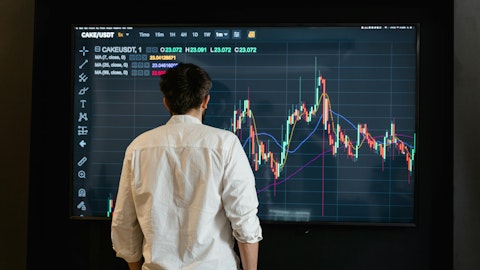We recently published a list of 10 Companies That Are Buying Back Their Stock in 2025. In this article, we are going to take a look at where Bank of America Corporation (NYSE:BAC) stands against other companies that are buying back their stock in 2025.
Stock repurchases are the most discretionary form of capital allocation and have also become over time the most dominant for the US corporations. Unlike dividends, which create a recurring obligation, or capital expenditures, which are often a necessity to maintain the business operations going, buybacks offer flexibility – companies can repurchase shares when excess cash is available and halt the program during downturns or when capital allocation priorities shift. A buyback reduces the number of outstanding shares, effectively increasing earnings per share, and are therefore often seen as a form of instant gratification – prefer immediate upward pressure on stock prices over long-term gains from strategic reinvestments. Critics argue that buybacks can signal a lack of attractive reinvestment opportunities in the core business, as firms would most likely prioritize any potential project that could strengthen the competitive position and boost the growth trajectory. While such scenarios are certainly possible in some cases, proponents view stock repurchases as a natural adjustment to limited or uncertain growth opportunities or a way to return excess cash to investors in a more tax-efficient way than dividends.
Also read: 10 Technology Stocks with Insider Buying in 2024
One of the primary reasons behind stock buybacks is to support the share price during periods of economic uncertainty or market volatility. It is well known that the management possesses insider information and has much greater visibility into the business trajectory; thus, when a company perceives that its stock is undervalued and repurchases significant amount of its own stock, it can signal confidence and boost morale among the entire shareholder base. Successful investors like Warren Buffett have spoken favorably about buybacks when executed at prices below intrinsic value, emphasizing that they can be an intelligent use of capital when alternative investments offer lower returns. However, buybacks have also faced scrutiny for their potential to artificially inflate stock prices and reward executives who are compensated based on EPS growth. The debate intensifies when companies borrow money to finance these operations, which can strain balance sheets in times of economic distress and depletes the cash reserves without any claw-back option.
Recent legislative developments have placed buybacks under greater regulatory and tax scrutiny – the Inflation Reduction Act of 2022 introduced a 1% excise tax on stock repurchases, aimed at curbing excessive reliance on buybacks and encouraging reinvestment in business operations and employee wages. In short, the purpose behind these regulatory attempts was to limit the hoarding of capital into investors’ hands and stimulate reinvestments that would fuel economic growth and create jobs. Despite this, repurchase activity remains robust, with S&P 500 firms continuing to allocate substantial capital to buybacks. For reference, data published by S&P Global shows that the total dollar volume of stock repurchases during 3Q 2024 increased 22% YoY. Some investors argue that government regulations will have limited impact, as corporations may simply adjust capital allocation strategies or increase leverage to maintain shareholder returns. As the US stock market experienced a strong rally throughout 2024 and reaching new all-time highs in the second half of the year extending into 2025, studying companies that repurchase significant amounts of their own stock may offer unique insights into their business; the key question to answer though is whether these operations signal an undervalued stock price or a lack of profitable reinvestment opportunities in the near-term.
Our Methodology
For our list of companies that are buying back stock we selected the top 10 companies in the S&P 500 index with the largest dollar volume of shares repurchased during Q3 2024, as reported by the S&P Dow Jones Indices. We ranked them according to their buyback activity for the quarter and also added the number of hedge fund holders for each company in this analysis.
Why are we interested in the stocks that hedge funds pile into? The reason is simple: our research has shown that we can outperform the market by imitating the top stock picks of the best hedge funds. Our quarterly newsletter’s strategy selects 14 small-cap and large-cap stocks every quarter and has returned 373% since May 2014, beating its benchmark by 208 percentage points (see more details here).

A professional banker providing consultation to a customer in the security of his office.
Bank of America Corporation (NYSE:BAC)
Q3 2024 buybacks: $3.53 billion
Number of Hedge Fund Holders: 113
Bank of America Corporation (NYSE:BAC) is one of the largest financial institutions in the US, providing a broad range of banking, investment, and wealth management services to individuals, businesses, and institutions. With a strong retail banking presence and a robust digital platform, the company serves millions of customers through checking accounts, credit cards, mortgages, and lending solutions. Its investment banking and asset management divisions, including Merrill and BofA Securities, offer advisory, trading, and financial planning services.
Bank of America Corporation (NYSE:BAC) had a strong calendar 2024 and beginning of 2025, with the stock price approaching the 5-year high. The company generated $102 billion in revenue and reported net income of $27.1 billion with EPS of $3.21, achieving an 83 basis points return on assets and 13% return on tangible common equity in FY2024. The bank demonstrated strong financial position with $953 billion in liquidity and $201 billion in regulatory CET1 capital, maintaining a CET1 ratio of 11.9%. Net interest income showed positive momentum, bottoming at $13.9 billion in Q2 2024 and rising to $14.5 billion in Q4, with expectations for record NII in 2025. The bank experienced growth across all business segments, with deposits growing for six consecutive quarters and consumer loans growing in every category during the quarter. Asset quality remained strong with declining net charge-offs, while the bank returned $21 billion of capital to shareholders in 2024, representing a 75% increase from 2023 – $3.5 billion of which are attributed to stock repurchases in 3Q.
Overall, BAC ranks 10th on our list of companies that are buying back their stock in 2025. While we acknowledge the potential of BAC as an investment, our conviction lies in the belief that AI stocks hold greater promise for delivering higher returns and doing so within a shorter timeframe. If you are looking for an AI stock that is more promising than BAC but that trades at less than 5 times its earnings, check out our report about the cheapest AI stock.
READ NEXT: 20 Best AI Stocks To Buy Now and Complete List of 59 AI Companies Under $2 Billion in Market Cap
Disclosure: None. This article is originally published at Insider Monkey.





